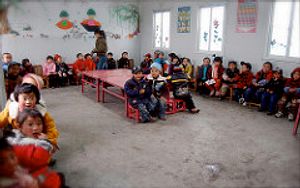Two public incidents prompting national outrage have dominated Chinese social media this week: one is the mass eviction of Beijing’s migrant workers, as The Diplomat reported yesterday; the other is a children abuse scandal that broke out at a high-end kindergarten in Beijing.
If some of China’s middle class still believe that the forced evictions have nothing to do with them — since the direct victims of the eviction are mainly less-educated, low income people, or so-called “low-end labor” — then the high-end kindergarten scandal has unquestionably shattered the middle class’ illusion that financial prosperity can guarantee them a secure environment in China.
Recently, multiple parents discovered needle marks on their children’s bodies. According to some of these parents’ accounts to media outlets, their children later said that they had been injected with unidentified substances, were given unidentified white pills after lunch every day, and had been forced to stand naked as a punishment. Some parents even alleged that their children suffered sexual molestation.
All these children — aged three to six — were students at an RYB kindergarten located in a middle-class district in Beijing.
The kindergarten is a branch of the New York-listed company RYB Education (RYB stands for red, yellow, and blue). RYB Education, according to its own official website, has more than 1,500 pre-kindergartens and 500 “high-end” kindergartens all over China; these facilities provide education to a total of 300,000 kids every week. Millions of children have studied at RYB Education schools.
Prior to the latest scandal, other RYB Education facilities had also been implicated in child abuse cases.
To make matters worse, weeks before the latest scandal broke out, a similar scandal that took place at a Shanghai kindergarten had already sparked a round of public outrage. In that Shanghai kindergarten, parents had acquired video footage of teachers beating toddlers and force-feeding them wasabi.
The latest Beijing scandal added more fuel to the social media explosion. Thousands of netizens sharply criticized RYB Education and questioned the general situation of China’s kindergartens: if such child abuse could happen at high-end education facilities in the two most international and developed cities in China, what could have happened to the children living in second-tier cities and even in remote areas?
Chinese media later calculated that since 2010, more than 60 cases of physical abuse in Chinese kindergartens and child care facilities have been reported nationwide.
What has made the Chinese public even more furious is the Chinese authorities’ poor reaction.
So far, the Beijing police has detained a 22-year-old teacher “on suspicion of mistreating persons in her care,” without confirming or denying any of the allegations above. Nor did the police release the closed-circuit video to the parents, as the public has been demanding.
Furthermore, when the scandal broke out, there were rumors that the specific kindergarten in question has close relations with the Chinese military; some social media posts claimed the kindergarten’s dean’s husband is a military official. In response, the police efficiently detained a netizen, accusing her of spreading rumors related to Chinese military, but the police offered no clarification as to the truth of the rumors.
In addition, Chinese censors have been fiercely deleting all related information about the scandal on Chinese social media. Thousands of commentaries and articles posted by Chinese citizens, as well as a series of Chinese media reports, were deleted within hours. Despite that, Chinese netizens have reposted their opinions again and again.
Some people pointed to teachers’ low salaries as the fundamental reason for recurring child abuse scandals. However, parents who spoke to the media revealed that they had to pay about 3,000 yuan to 5,000 yuan (around $400 to $700) per month to the RYB kindergarten in Beijing. That tuition fee is almost as high as Chinese citizens’ average monthly income in 2016.
Others suggested that closed-circuit cameras should be installed in all Chinese kindergartens. However, closed-circuit cameras had been installed in the above two kindergartens; those cameras didn’t prevent teachers from hurting toddlers.
By forbidding the Chinese public and the Chinese media from seeking the truth, the Chinese government seems to have successfully suppressed the public opinion, but in fact the censorship has left Chinese parents across the country in a trust crisis as they seek to find kindergartens for their children.

































